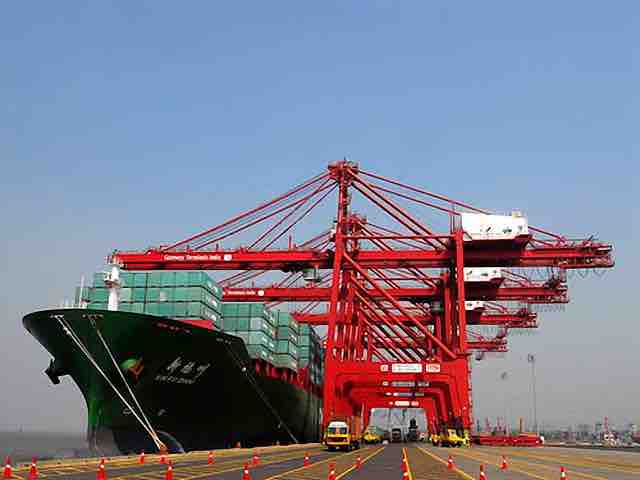Shipping is a physical process of transporting commodities, merchandise goods, and cargo, by land, air, and sea.
Land or "ground" shipping can be by train or by truck. In air and sea shipments, ground transportation is required to take the cargo from its place of origin to the airport or seaport, and then to its destination, since it is not always possible to establish a production facility near ports due to limited coastlines of countries. Ground transportation is typically more affordable than air shipments, but more expensive than shipping by sea, especially in developing countries, where inland infrastructure is not efficient.
Shipment of cargo by trucks, directly from the shipper's place to the destination, is known as a door to door shipment, and more commonly called multimodal transport system. Trucks and trains make deliveries to sea ports and air ports where cargo is moved in bulk.
Much shipping is done aboard actual ships. An individual nation's fleet, and the people that crew it, are referred to as its merchant navy or merchant marine. Merchant shipping is lifeblood to the world economy, carrying 90% of international trade with 102,194 commercial ships worldwide. The term "shipping" in this context originated from the shipping trade of wind power ships, and has come to refer to the delivery of cargo and parcels of any size above the common mail of letters and postcards.
Common trading terms used in shipping goods internationally include:
- Freight on board, or free on board (FOB): the exporter delivers the goods at the specified location (and on board the vessel). Costs paid by the exporter include loading, securing, etc. For example, "FOB JNPT" means that the exporter delivers the goods to the Jawahar lal Nehru Port, India, and pays for the cargo to be loaded and secured on the ship.
- Cost and freight (C&F, CFR, CNF): Insurance is payable by the importer, and the exporter pays all expenses incurred in transporting the cargo from its place of origin to the port/airport and ocean freight/air freight to the port/airport of destination. For example, C&F Los Angeles (the exporter pays the ocean shipping/air freight costs to Los Angeles). Most governments ask their exporters to trade on these terms to promote their exports.
- Cost, insurance, and freight (CIF): Insurance and freight are paid by the exporter to the specified location. For example, at CIF Los Angeles, the exporter pays the ocean shipping/air freight costs to Los Angeles including the insurance of cargo. This also states that responsibility of the shipper ends at the Los Angeles port.

Shipping
Harbour cranes unloading cargo from a container ship at the Jawaharlal Nehru Port, Navi Mumbai, India